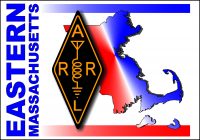NEWINGTON, CT, Feb 17, 2006–The Amateur Radio Emergency Service (ARES), the Military Affiliate Radio System (MARS) and the HF digital e-mail system Winlink 2000 all got positive mentions in a post-Katrina report from the US House of Representatives. US Rep Tom Davis (R-VA) chaired the panel. References to ARES, MARS and Winlink appear in “A Failure of Initiative”–the final report of the Select Bipartisan Committee to investigate the preparation for and response to Hurricane Katrina.
“LIKE all levels of government,” the 364-page report notes, the National Communication System (NCS), “was not able to address all aspects of the damage to the communications infrastructure of the Gulf States.”
MARS was cited for its role as part of the Shared Resources High Frequency Radio Program (SHARES), an emergency federal communication system put into play when other resources are unavailable. The report says that “within days” of Katrina’s landfall, NCS called upon more than 430 SHARES stations across the US to, among other things, assist first responders conducting search-and-rescue missions by relaying information to government agencies, by relaying logistical and operational information among FEMA EOCs in Georgia, Mississippi and Louisiana, and by handling health-and-welfare messages between volunteer agencies in Georgia and the American Red Cross national headquarters.
“ADDITIONALLY, the NCS coordinated the frequencies used by the nearly 1000 Amateur Radio Emergency Service (ARES) volunteers across the nation who served in the Katrina stricken area providing communications for government agencies, the Red Cross and The Salvation Army,” the report continued. “Emergency communications were conducted not only by voice, but also by high-speed data transmissions using state-of-the art digital communications software known as Winlink.”
THE report further noted, “In Mississippi, FEMA dispatched Amateur Radio operators to hospitals, evacuation centers, and county EOCs to send emergency messaging 24 hours per day. It further cited comments from Bay St Louis Mayor Edward A. “Eddie” Favre that Amateur Radio operators “were especially helpful in maintaining situational awareness and relaying Red Cross messages to and from the Hancock County (Mississippi) EOC.”
ACCORDING to the report, radio amateurs at airports in Texas and Louisiana “tracked evacuees and notified families of their whereabouts,” while the Red Cross “deployed Amateur Radio volunteers at its 250 shelters and feeding stations, principally in Mississippi, Alabama and Florida.”
THE Salvation Army, the report pointed out, operates its own system of Amateur Radio volunteers known as SATERN (Salvation Army Team Emergency Radio Network). “During the Hurricane Katrina response and recovery effort, SATERN joined forces with the SHARES program and received over 48,000 requests for emergency communications assistance utilizing federal frequencies made available via the SHARES program,” the report noted.
“THE extent of destruction and damage to the communications infrastructure and services caused by Katrina exceeded that of any other natural disaster experienced by the Gulf Coast states,” the report concluded. “Simply put, Katrina’s devastation overwhelmed government resources at all levels.”
“A Failure of Initiative” asserted that the loss of power and the failure at various levels of government “to adequately prepare for the ensuing and inevitable loss of communications” hindered the hurricane response “by compromising situational awareness and command and control operations.”
“DESPITE the devastation left by Katrina, this needn’t have been the case,” the report stressed. “Catastrophic disasters may have some unpredictable consequences, but losing power and the dependent communications systems after a hurricane should not be one of them.”
The full report is available at: http://katrina.house.gov/

